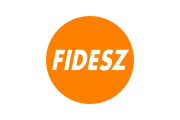
Back Fidesz Afrikaans فيدس – الاتحاد المدني المجري Arabic فيدس – الاتحاد المدنى المجرى ARZ Фідэс BE-X-OLD Фидес Bulgarian Fidesz – Unió Cívica Hongaresa Catalan Fidesz – Maďarská občanská unie Czech Fidesz Danish Fidesz – Ungarischer Bürgerbund German Φίντες – Ουγγρική Συμμαχία Πολιτών Greek
Fidesz – Hungarian Civic Alliance Fidesz – Magyar Polgári Szövetség | |
|---|---|
 | |
| President | Viktor Orbán |
| Vice presidents | |
| Parliamentary leader | Máté Kocsis |
| Founders | Viktor Orbán Gábor Fodor László Kövér István Bajkai Zsolt Bayer Tamás Deutsch Zsolt Németh József Szájer |
| Founded | 30 March 1988 |
| Headquarters | Visi Imre utca 6, 1089 Budapest |
| Think tank | Foundation for a Civic Hungary |
| Youth wing | Fidelitas |
| Ideology | |
| Political position | Right-wing to far-right |
| National affiliation | Fidesz–KDNP (since 2005) |
| European affiliation | Patriots.eu (2024–present) European People's Party (2004–2021) |
| European Parliament group | Patriots for Europe (since 2024)[nb 1] |
| International affiliation | |
| Colours | Orange |
| National Assembly | 116 / 199 |
| European Parliament | 10 / 21 |
| County Assemblies | 227 / 381 |
| General Assembly of Budapest | 10 / 33 |
| Party flag | |
 | |
| Website | |
| www | |
Fidesz – Hungarian Civic Alliance (Hungarian pronunciation: [ˈfidɛs]; Hungarian: Fidesz – Magyar Polgári Szövetség pronounced [ˈfidɛs ˈmɒɟɒr ˈpolɡaːri ˈsøvɛt͡ʃːeːɡ]) is a right-wing populist and national-conservative political party in Hungary led by Viktor Orbán. It has increasingly identified as illiberal.
Originally formed in 1988 under the name of Alliance of Young Democrats (Fiatal Demokraták Szövetsége) as a centre-left and liberal activist movement that opposed the ruling Marxist–Leninist government. It was registered as a political party in 1990, with Orbán as its leader. It entered the National Assembly following the 1990 parliamentary election. Following the 1998 election, it successfully formed a centre-right government. It adopted nationalism in the early 2000s, but its popularity declined due to corruption scandals. It was in opposition between 2002 and 2010, and in 2006 it formed a coalition with the Christian Democratic People's Party (KDNP).
Fidesz won a supermajority in the 2010 election, adopted national-conservative policies, shifted further to the right and became Eurosceptic. In 2011, the new Hungarian constitution was adopted in the parliament and in 2012 it became effective, although it was subject to controversies due to its consolidation of power to Fidesz. Having set Hungary on a path of democratic backsliding, its majority of seats remained after the 2014 election, and following the escalation of the migrant crisis, Fidesz began using right-wing populist and anti-immigrant rhetoric.
Following the 2022 Hungarian parliamentary election, it currently holds a majority in the National Assembly with 135 seats. It has also held the presidency since 2010, has endorsed the election of every president since 2000, and it enjoys majorities in all 19 county assemblies, while being in opposition in the General Assembly of Budapest. Fidesz was initially a member of the Liberal International until 2000, after which it joined the European People's Party. It remained its member until 2021, and since then it has served with the Non-Inscrits group within the European Parliament. On 30 June, 2024, the ANO 2011, the Freedom Party of Austria, and Fidesz, created a new alliance named Patriots for Europe.[1]
Cite error: There are <ref group=nb> tags on this page, but the references will not show without a {{reflist|group=nb}} template (see the help page).
- ^ "Hungary's Orban announces plan to form new far-right bloc in EP". euronews. 30 June 2024. Retrieved 30 June 2024.